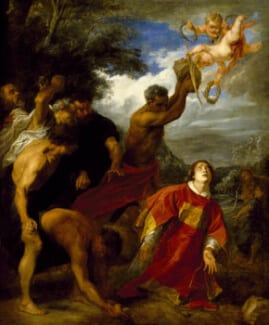
I’m always on the lookout for ways that I connect with the Faith, especially when it comes to the readings and rituals at Mass. My wife’s brother’s name matches one of the Gospel writers, so whenever we have a Sunday reading that matches his name, she nudges my arm. Our son’s name matches an Old Testament book, so we always give him a thumbs-up whenever we hear a reading from there. We used as passage from the Book of Job in our wedding, so we’re always happy when that book appears. And many of the saint names that are listed during the liturgy of the Eucharist have a meaning to us as well.
Today’s first reading — from Acts — aligns with the feast day we celebrate today: the Feast of Saint Stephen. Ever since I first started coming into the Faith, this saint obviously resonated with me (even if he did spell his name “wrong”). And whenever he’s mentioned at Mass, I get a charge of, “That’s one of my guys!”
I’m an optimist, so I see the short form of St. Stephen’s story to be pretty inspiring: Hear the call of God, step up, try to help out. What’s the worst that can happen? You make it to Heaven a bit sooner than you might’ve expected.
Of course, that’s a rather flippant way of looking at his life. But it also seems to me to be a good encapsulation of the promises of Christ: If the worst threat that this mortal world can offer you is death (even a painful one) . . . well, it seems like a small thing to risk when the rewards of following Christ are infinitely greater.
So, it’s obvious that I like St. Stephen’s Day. But what’s it doing here, right after Christmas?
I leave the “official” explanations for others . . . although — being the Catholic faith — an answer that involves the word “tradition” seems very likely.
However, for me the commemoration of St. Stephen on this day is a reminder of how quickly and powerfully a life with Christ can go from something sweet and innocent and greeting-card worthy (Christmas Day) to something that’s more dangerous, where the call to action and the potential consequences are both greater.
To the occasionally religious secular world, Christmas Day is about cooing over a baby and giving each other presents; folks steeped in television-flavored faith are totally on board with that. But St. Stephen’s Day is a day when words and deeds collide, when the actions and consequences of what the birth of Jesus would come to signify for early Christians comes into all-too-real clarity. Sadly, this realization scares some folks away. But — for others — it’s a good reminder of why we’re really here, once the wrapping paper has been recycled and folks are looking at the prospect of leftovers for the next while.
On this feast day, consider what might be your “first” action as a Christian living a Christian life, following the prayerful reflection of Advent and celebrations of the Christmas Day. Whatever you do need not involve as much peril as St. Stephen, but it should definitely be true to the teachings of Christ and our community. (if you’ve already done something Christ-worthy, congratulations! You’ve beat the post-holiday rush in your own spiritual way!)
Also, if you have some aspect of Mass that always gives you a secret smile — like St. Stephen does for me — consider reflecting on that aspect today. If you share the Faith with someone in your life, maybe mention it if they don’t already know. (Or consider sharing here! We love to read how the Faith finds root in our readers.) If you don’t have any such element in your visits to Mass, perhaps keep an eye and ear out for something that sparks your interest; it could be the Spirit trying to tap you on the shoulder.
